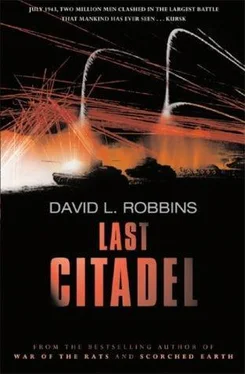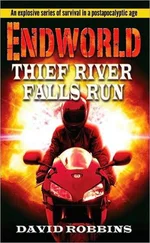‘Filip,’ he muttered, ‘where are we going?’
A rustle of hooves rose behind Breit. He turned his head in time to see dark Josef’s raised and swinging elbow. The blow caught him in the temple.
Breit would have collapsed out of the saddle but his boots snagged in the stirrups and did not let him go over. Through sizzles of pain in his skull, his senses took hold enough to tell him he was dangling, wincing into the ribs of his horse. He cowered behind a raised arm and clung to the saddle horn with the other. He feared to sit upright into another shot from Josef. He gulped air to quell the pounding in his head. He straightened before he tumbled to the ground. The reins had slipped through his hands, hanging loose around the horse’s neck. The stubborn animal began to angle down to the river. Breit blinked, doing his best to gather the reins in.
No one spoke. No one struck him again. Filip nudged his horse away to put distance between them.
July 10
0715
outside the village of Vorskla
Katya reined in her horse. The carbine strapped across her back jangled, the pistol in her belt poked at her abdomen. Filip stopped his mount beside her. Daniel, Ivan, and Josef hung back with the German prisoner behind the crest overlooking the village, out of sight in their saddles.
The Vorskla River ran glinting behind the rows of small houses. The village was partitioned by pickets and dirt alleys. Women milled in the spaces between structures with aprons empty of bread, no chickens to feed, and no seed to toss them if there were. A few men bent in the broken fields, scavenging for unripe vegetables to eat. Filip shook his head. He was still the starosta of this village, and it was dying. He tugged the brim of his felt hat and rode forward without Katya. She prodded Lana and moved behind him down the long incline to the sad streets.
Approaching the village, a clutch of women looked up at the clopping horses. The women moved closer together the way penned animals do, until their hips touched, their aprons made a white barrier to the two riders. Filip was their elder. This made no difference to the old women barring his way. Filip rode into the village with a partisan.
One of the women spoke up to Filip. The elder man had drawn himself very erect, his hands were crossed on the saddle horn. He donned the cold posture of the brigand, of Colonel Plokhoi.
‘You’re back,’ the woman said.
Filip nodded. His wide brim bobbed, shading his face.
‘Leave him alone, Filip Filipovich,’ the woman said. ‘He’s your brother.’
The starosta made no notice of her words.
‘He’s frightened, Filip Filipovich,’ she said.
The elder lifted his eyes from the woman. He goaded his horse toward her and the three women beside her, women Katya decided were her sisters. The aprons parted and Filip rode past without another glance downward. Katya followed.
The morning street raised dust under their hooves. The northern horizon was quiet now, the sounds of the battle raging did not reach the village. Vorskla was no longer just ten kilometers from the front, the Germans had pushed the Soviet lines far back. How far, Katya did not know. But it was a bad thing that she did not hear the fighting.
Every movement in the village stopped when they rode past. The few men straightened in the fields to look over the tops of stalks and grasses, they looked like scarecrows in white billowy blouses. Women continued to gravitate toward each other, pressing shoulders and hips, whispers to ears. Filip rode to a small blue house. Its eaves were festooned with white gingerbread and shutters. Filip stopped in front of the porch. Neighbor women came on their stoops to watch and cluck. Katya saw her first child in this village. A boy, very dirty, gripped a woman’s skirt and pulled it in front of him, a naive shield. Filip did not dismount. He waited, his horse shifted, the rifle on Filip’s back creaked, the leather and harness rattled.
The door to the house stood open, the day was going to grow hot. Inside, the house was full of shadows. Filip stared straight ahead, some duel of wills going on with the brother inside. The man’s a coward, Katya thought. He’s a collaborator. Enough.
She slid off her horse and hit the ground walking. Before she’d taken two steps, the pistol was in her hand and cocked.
‘Nikolai!’ the starosta called to his brother. Katya halted.
Inside the house, footsteps dragged on the boards. A man emerged from the shadowed rooms. Katya stood in the full steppe sun and it took a moment for her to realize what she saw standing on the rickety porch.
Filip’s twin.
The two old men shared the same nose, lean stature, gray grimness, everything that brothers born seconds apart can share. But in a moment Katya saw what they did not have in common. This brother was weak. Filip would truly kill him one day.
Filip spoke. ‘You’re coming with us.’
The twin eyed his brother with a wary grimace. ‘I’m no fighter. You’re the fighter.’
Katya kept herself in check. She almost spoke for Filip Filipovich, she almost said to this brother, ‘And you’re the traitor. Now get on a fucking horse.’
‘Katya. Get the others.’
Filip did not look away from Nikolai. The eyes of the two were ensnared, the brothers’ glares tangled like snakes across the dusty road. Katya tucked the pistol into her belt. She swung to her saddle and turned for the hill where the others waited with the prisoner and an extra mount. Riding away, she saw over her shoulder Nikolai turn and go back inside his house. Filip stayed in his saddle, staring after his brother, his face obscured under the big felt hat.
July 10
0800 hours
three kilometers west of Kazatskoe
The partisans, Breit the prisoner, and Nikolai the traitor rode through an eerie peace. They took their horses and the empty mount into the open, across fallow fields and wide vales of grass. The sun stood at its highest and the horses walked on their own shadows. Nothing impeded the riders’ vision for many kilometers, the land sprawled even and untended. The riders were far from the fighting here and the day appeared normal, sunny and quiet. Katya was lulled for a little while by the sounds of hooves in dirt, men in saddles, and the gold of warmth on her skin.
None of the men spoke. Filip rode in front, leading his twin brother to Kazatskoe. Daniel and Ivan came next, riding on either side of the German. Breit kept his mouth shut since Josef had clouted him, and he rode better, too, wanting no more attention for himself. Good, Katya thought, she had enough to worry about. Josef came at the rear. She turned to look at him from time to time to be sure the man was still there, separate and grim.
She cued her horse ahead of Daniel, Breit, and Ivan. She passed Nikolai. The brother’s head was down, as though riding to his gallows. She sidled up next to Filip. The starosta did not turn his head.
‘Are you angry with me, Filip?’
‘Yes. I don’t want to do this.’
Katya leaned from her saddle to touch the old man’s forearm. ‘I know.’
‘He’s my brother.’
Now Filip swiveled his face to her. His eyes glistened.
‘It’s easy, Witch, when he’s not right here behind me. It’s easy to talk about how I’ll do this and that. But I understand him. Better than anybody.’
His long nose was sharper than any feature of the landscape. His eyes were fixed on nothing Katya could see with him.
‘I’m sorry, Filip Filipovich.’
The starosta nodded, his big brim dipped.
‘We were all so hungry, Witch. I’m sure you don’t understand that kind of hunger. The Germans gave us food because Nikolai helped them. They stopped punishing our village, stopped taking our men. Nikolai saved us. I ate the food. I lived in my house. I’m as bad as him. I won’t judge him.’
Читать дальше












